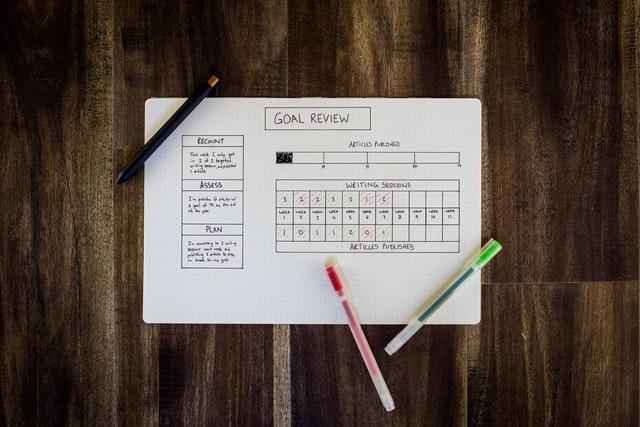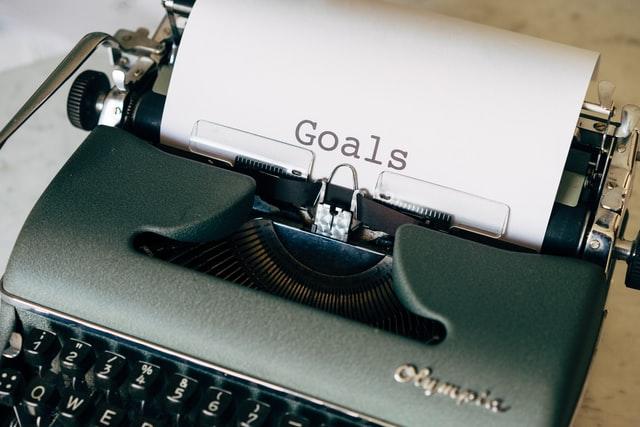As the school year gets underway, perhaps the last thought on your mind is marking your progress and setting any goals. Indeed, after the year we've just had - and amidst the ongoing pandemic, just going to school is a treat. Never mind tracking and achieving anything.
That's exactly the wrong attitude to have.
Renowned management consultant Peter Drucker said, "If you can't measure it, you can't improve it". To that, you might reply: "Why should I measure anything? My teachers record my marks; all I have to do is show up and perform."
You're absolutely correct on that point but, in thinking that way, you overlook the point of your academic experience.
Your teachers will indeed track your grades but they have no way to measure your personal growth. They have no obligation to track your cognitive skills and critical thinking abilities, or how good you're getting at making intuitive leaps to bridge your knowledge gaps.
And, they have no idea what you hope to accomplish or how you plan to do it. In other words, teachers aren't going to measure your progress in the stuff that matters to you.
So, leave the marking to the teachers. Let Superprof show you why and how to set personal goals, and how to measure your progress towards reaching them.

The Goals to Set
Motivational speakers usually talk about setting goals in a business or adult-life context. After all, with most of your life under other peoples' control - your caregivers and teachers, the only thing you have to manage is following directions, right? Wrong!
Any instruction or direction you receive is a frame. How you fit yourself into it makes all the difference in the world. Simply following orders does not allow you any personal accomplishment, no matter how well or willingly you do what you're told to do.
And, speaking of things you're told to do...

If you're in your last year of Key Stage 3, you've likely been told to start thinking about which GCSE subjects you want to study. How are you going to decide? Here's how you need to think about the matter.
Most employers expect at least eight passing GCSE results. You have to sit Maths and English GCSEs, as well as a Science - but you get to choose which one. That means you have six subjects to pick, all on your own. Well, probably with help from the adults in your life.
This is a major decision that will impact your entire future. It's not a good idea to leave it till the last minute.
Likewise, it's not a good idea to choose only easy subjects or ones you're good at. A blend of easy and challenging subjects proves to those future employers that you are willing to reach beyond your comfort zone.
That's great advice if you're planning on an apprenticeship after secondary school but what if you're aiming for a university degree? Here, too, you will need targeted courses to suit your degree plan's requirements.
All of this shows that choosing GCSE subjects is not a snap decision. Doing so takes time and deep thought. If this last KS3 year example applies to you, you might set a goal to research and choose your GCSE topics by semester's end or during winter holiday.
And, if you're currently preparing for your GCSEs, you should set goals to research apprenticeships or A-Level courses, depending on which route you want to take.
Other goals you might set if you're:
- always in trouble for late homework: do it the day it was assigned or as soon as possible
- learning a second language: take a proficiency test by the end of the school year
- hard to wake up in the morning: go to bed earlier
- always rushed in the morning: pack your bookbag and lay out your clothes before bed
- too late to have any breakfast: set your alarm to wake you up 30 minutes early
- the early wake-up goal also applies if you're always late to school
- always bored in class: determine to learn one new thing on your own each day
My student days aren't so far behind me that I don't remember how stressful it was to rush around in the morning, getting ready for school. No time to eat breakfast, I'll be late! And then, hungry all day, unable to focus...
As you can see, these goals have (almost) nothing to do with the marks your teachers give and everything to do with how you manage your life.
And that's the importance of setting goals, really. They're all about your personal development.
How Goals Help Track Your Progress

You know your feet are getting bigger because your shoes become suddenly too small. You know you're growing because your trouser legs get too short. What signs are there that your personal development is on track?
That, you have to do on your own.
Let's say you've always put off things till the last minute. Now, you're ready to turn over a new leaf - an admirable goal for the beginning of the school year. As procrastination is a long-term habit, you will need more than a resolve to break it. You write this goal down and, every time you finish - your homework, washing up or whatever the goal you set for yourself is, you put a tick next to it.
It might look something like this:
| TASK | MONDAY | TUESDAY | WEDNESDAY | THURSDAY | FRIDAY | SATURDAY | SUNDAY |
|---|---|---|---|---|---|---|---|
| Eat Breakfast | X | X | X | X | |||
| Do Homework | X | X | X | X | |||
| Study Subjects | X | X | |||||
| Extra French Practice | X | X | X | X | |||
| Lay out Clothes/school stuff | X | X | X | X | X | X | |
| Early Bed time | X | X | X |
As you can see, our sample students did not complete every task as they were supposed to. They did not meet their goal this week, meaning there is room for improvement. Next week's goal might be having a tick in every box.
If you make checking every task off your list a part of your goal, you'll notice your procrastination habit is turning into a proactive habit. Soon, you'll realise that you're taking care of business on your own. Look at you, you sterling example of personal growth!
What reward should you give yourself for achieving that goal?
Different Ways to Track Your Goals
Managing your life and fostering personal growth are prime reasons to set goals for yourself but, per our example above, you need some way to keep track of how you're coming along. Luckily, there are a few ways you could do that.

A Checklist
When you think about it, the list of things you have to do is pretty long. You have to wake up on time to have breakfast and get ready for school; you have to be at school on time, too. While there, your time is managed for you but, when you get out of school, you likely have tons of stuff to do.
Doing homework, cleaning your room, washing clothes, having tea, taking care of any pets... and those are just general things. You might have more.
Some people think a to-do list is too corny... but wouldn't it be better than your parents constantly reminding you you have to do this, that or the other?
For the list of daily tasks that you've made a goal to tackle without parental reminders, a checklist is a perfect tool.
A Diary
Now, we're talking about bigger goals; ones that will take longer to reach. Choosing GCSE subjects, for example. As mentioned earlier, this goal takes time to reach.
You have to figure out what kind of career you want, which study subjects will put you on that path and whether it's a flexible enough subject that, if you change your mind about your future career, that subject will still count toward any future effort.
In your diary, write down which subject(s) you will research, what to look for in each subject - adaptability, suitability and whether you have the skills, knowledge and desire to study it. And then, give yourself a time limit for each subject.
In three weeks, you'll make your decision, each night you will study up on a particular aspect and, every day, record your process. All of that leads up to your main goal of choosing your subjects by the end of the semester.
Stars on the Board
Expanding on charts as a way to track your daily progress towards achieving your goals, using a dry-erase board to record your weekly progress allows you to post whether you excelled, did the bare minimum or failed to reach that particular goal on that day.
You might colour-coordinate your board - red means fail, green means 'well done!' and blue is 'try harder tomorrow'. Or you could use stickers, emojis... any way to populate your daily goals chart.
You have things you want to do and things you have to do. Obviously, doing what you want to do is more fun but you can't get away from the 'have to's. Doesn't it just make sense to put all of the 'have to's in order? That way, you can have the rest of your time for the fun stuff.
Keeping track of your goals - short-term and long-term ones is the best way to make sure you don't miss anything.
Now, learn more about back to school goals...
Summarise with AI:















